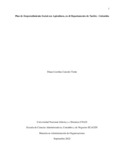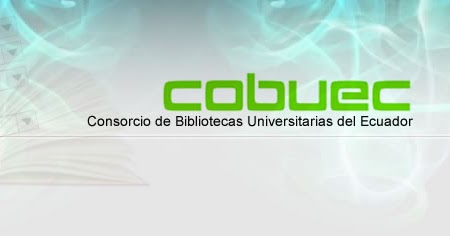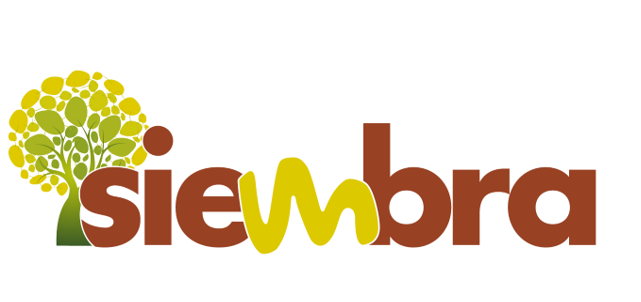Mostrar el registro sencillo del ítem
Plan de Emprendimiento Social con Apicultura, en el Departamento de Nariño – Colombia
| dc.contributor.advisor | Zamudio Alarcón, José Pedro | |
| dc.coverage.spatial | cead_-_pasto | |
| dc.creator | Caicedo Terán, Diana Carolina | |
| dc.date.accessioned | 2022-09-26T19:30:21Z | |
| dc.date.available | 2022-09-26T19:30:21Z | |
| dc.date.created | 2022-09-06 | |
| dc.identifier.uri | https://repository.unad.edu.co/handle/10596/51509 | |
| dc.description | No aplica | |
| dc.description.abstract | Los polinizadores entre ellas las abejas, son muy importantes para la vida integral en el planeta tierra. La apicultura como actividad agroecológica ofrece a la comunidad, productos ambientalmente sostenibles, nutricionales, con propiedades terapéuticas asociadas y además puede edificar socialmente en su ejercicio. Sin embargo, para el ejercicio apícola son varias las amenazas y son pocas las acciones efectivas que garantizan la sobrevivencia de esta actividad pecuaria y de estos insectos. Por ello, teniendo en cuenta la importancia de las acciones locales, esta investigación traza un eje de ruta para un emprendimiento social y asociativo en apicultura, aplicado al departamento de Nariño, Colombia, pudiendo ser adaptable a otras localidades. En ese sentido, esta investigación se desarrolla a partir de cuatro estudios. El primero, un estudio de mercado, en el cual se exalta a la miel de abejas, como el producto apícola más reconocido. El estudio de mercado identifica al cliente potencial, a través de la investigación con la salud humana, los alimentos y el mercado. También se incluyen estrategias de mercadeo explicadas a través del marketing mix tradicional. Segundo, estudio operacional, presenta el diagnóstico de la apicultura en el departamento de Nariño, basándose en datos del Instituto Colombiano Agropecuario (ICA), encuestas a apicultores, sondeos a miembros de la Asociación de Apicultores de Nariño (ASOAPINAR) y entrevista a una investigadora apícola de Nariño. Para finalizar este acápite, se presenta un análisis y descripción de actividades operativas. El tercer estudio es organizacional y revela un diagnóstico asociativo y un análisis del gremio apícola, presentando propuestas corporativas. Y el cuarto estudio es financiero y económico, en el cual se identifica el estimativo de inversión, ingresos e indicadores financieros para la idea de negocio. La investigación también incluye el análisis de la apicultura frente a: los objetivos de desarrollo sostenible (ODS), consideraciones políticas, factores económicos, realidades sociales, tendencias tecnológicas, argumentos ecológicos, determinaciones legales, perspectivas teóricas y nociones históricas. Incluyendo un enfoque social en los diferentes capítulos del proyecto. Este emprendimiento social, brinda herramientas para el sostenimiento de la apicultura, siendo básico el fortalecimiento asociativo y gremial de los apicultores y requiriendo de trabajo mancomunando interinstitucional. | |
| dc.format | ||
| dc.title | Plan de Emprendimiento Social con Apicultura, en el Departamento de Nariño – Colombia | |
| dc.type | Proyecto de investigación | |
| dc.subject.keywords | apicultura Nariño | |
| dc.subject.keywords | asociación de apicultores | |
| dc.subject.keywords | gremio apícola Colombia | |
| dc.subject.keywords | miel de abejas diferenciadas | |
| dc.subject.keywords | plan de emprendimiento social | |
| dc.description.abstractenglish | Pollinators, including bees, are very important for integral life on planet earth. Beekeeping as an agroecological activity offers the community, environmentally sustainable, nutritional products, with associated therapeutic properties and can also build socially in its exercise. However, for beekeeping there are several threats and there are few effective actions that guarantee the survival of this livestock activity and these insects. Therefore, considering the importance of local actions, this research traces a route axis for a social and associative enterprise in beekeeping, applied to el departamento de Nariño, Colombia, being able to be adaptable to other localities. In that sense, this research is developed from four studies. The first, a market study, in which honeybees is exalted, as the most recognized beekeeping product. The market study identifies the potential client, through research with human health, food, and market. Also included are marketing strategies explained through the traditional marketing mix. Second, operational study, presents the diagnosis of beekeeping in the department of Nariño, based on data from el Instituto Colombiano Agropecuario (ICA), surveys of beekeepers, surveys of members of la Asociación de Apicultores de Nariño (ASOAPINAR) and an interview with a beekeeping researcher from Nariño. To conclude this section, an analysis and description of operational activities is presented. The third study is organizational and reveals an associative diagnosis and an analysis of the beekeeping guild, presenting corporate proposals. And the fourth study is financial and economic, in which the estimated investment, income and financial indicators for the business idea is identified. The research also includes the analysis of beekeeping against the Sustainable Development Goals (SDGs), political considerations, economic factors, social realities, technological trends, ecological arguments, legal determinations, theoretical perspectives, and historical notions. Including a social approach in the different chapters of the project. This social enterprise provides tools for the support of beekeeping, being basic the associative and union strengthening of beekeepers and requiring inter-institutional joint work. | |
| dc.subject.category | Investigación |















